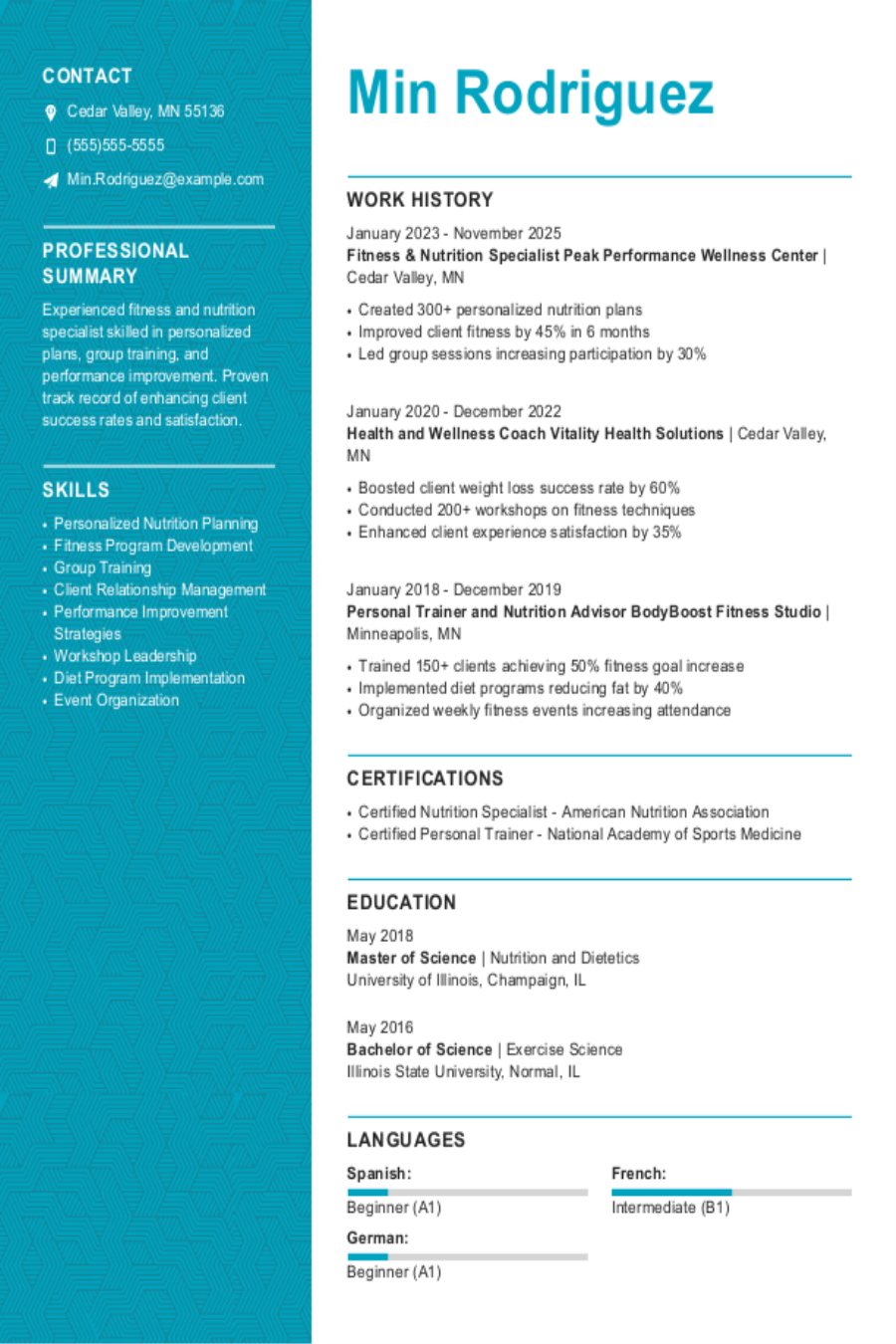Popular Office Manager Resume Examples
Entry-level office manager resume
An entry-level resume for an office manager should highlight organizational skills, multitasking abilities, relevant coursework, internships, and previous administrative roles that have prepared you for the responsibility of a management role.
Showcases education: This resume showcases the candidate's academic achievements and validates the candidate's business expertise and skills.
Focus on goals: The resume highlights a results-driven office manager who has demonstrated significant achievements in efficiency and employee satisfaction, showcasing a strong foundation in business administration and commitment to ongoing professional development.
Mid-career office manager resume
A mid-career office manager resume should emphasize a strategic mix of leadership experience, essential skills in organization and communication, and evidence of professional growth to appeal to potential employers.
Employs active language: Using action verbs such as "managed," "implemented," and "led" highlights initiative and measurable success, showcasing a proactive approach to improving office efficiency and team productivity.
Uses a neat template: A clean and well-organized layout allows hiring managers to quickly identify relevant skills and accomplishments, making it easier to recognize the applicant's potential contributions to their office environment.
Experienced office manager resume
An experienced office manager resume should prioritize clear examples of leadership, organizational skills, and successful project management to effectively showcase career accomplishments and professional growth.
Optimized for ATS: The resume features a polished, organized template that combines a professional header with an ATS-friendly resume design, effectively appealing to both human recruiters and automated systems during the hiring process.
Uses a traditional format: The chronological resume format clearly outlines the extensive experience of the job seeker, making it easy to navigate through their career achievements and demonstrating a consistent progression in office management roles over time.
More resume examples
Additional Guides
Office Manager Resume Template
Looking to create a standout resume? Begin with this office manager template as your base—simply personalize it with your unique qualifications and experiences.
Emma Davis
Albany, NY 12204
(555)555-5555
Emma.Davis@example.com
Professional Summary
Experienced office manager excelling in streamlining operations. Proven track record in boosting productivity by 25% and reducing costs by 15%. Skilled in team leadership, budget management, and process improvement.
Work History
Office Manager
Northside Office Solutions - Albany, NY
June 2022 - August 2025
- Managed budgets, cut costs by 15%
- Streamlined operations, improved efficiency 20%
- Led team of 10, enhancing productivity 25%
Administrative Supervisor
Midwest Corporate Services - Hillcrest, NY
May 2019 - May 2022
- Supervised staff, improved output by 30%
- Implemented office systems, saved ,000
- Organized events for 300+, raised brand awareness
Operations Coordinator
Central Business Solutions - New York, NY
May 2016 - April 2019
- Optimized schedules, increased accuracy 40%
- Reduced supply costs by ,000 annually
- Coordinated projects, completed 5% ahead of time
Skills
- Office Administration
- Budget Management
- Team Leadership
- Process Improvement
- Event Coordination
- Communication Skills
- Project Management
- Problem Solving
Education
Master of Business Administration Business Management
University of Illinois Champaign, IL
May 2016
Bachelor of Science Business Administration
University of Houston Houston, TX
May 2014
Certifications
- Certified Office Manager - International Association of Administrative Professionals
- Project Management Professional (PMP) - Project Management Institute
Languages
- Spanish - Beginner (A1)
- French - Intermediate (B1)
- German - Beginner (A1)
Writing Your Office Manager Resume
Having explored these effective resume examples, you're now prepared to dive into the details of crafting your own resume. We'll take you through each section step by step, ensuring you understand how to write a resume that stands out and highlights your qualifications.
List your most relevant skills
An effective skills section on your office manager resume should clearly showcase your abilities to manage administrative tasks, coordinate teams, and handle communications. It's important to include both hard skills like skill in office software and soft skills such as leadership and time management. This section is your chance to make a strong impression, so focus on the keywords from the job listing mentioned for office managers.
Keywords demonstrate that you meet the qualifications sought by recruiters and help ensure your resume passes through applicant tracking systems (ATS).
Example of skills on an office manager resume
- Proficient in managing office operations and streamlining administrative processes
- Strong communicator capable of effectively liaising between departments
- Adaptable team player with proven ability to handle multiple priorities
- Careful planner with exceptional organizational skills and attention to detail
Highlighting your soft skills on your resume can set you apart from other applicants. Employers greatly value interpersonal abilities, as they are often challenging to develop and play an important role in fostering a positive work environment.
Highlight your work history
The work experience section of your office manager resume is important for making a strong impression. It should showcase your achievements by providing concrete examples that demonstrate your impact on the organization. Use compelling language and relevant keywords to ensure hiring managers see the value you bring.
When listing job entries, include essential details such as your job title, the name of the employer, and the dates you were employed to help employers verify your background and establish your professional credibility.
Example of an office manager work experience entry
- Office Manager
Innovative Solutions Inc. - San Francisco, CA
January 2019 - Present - Oversee daily office operations, managing a team of 10 staff members to ensure smooth workflow and high productivity levels
- Implement new filing and organizational systems that improved document retrieval time by 30%
- Develop and maintain budgets for office supplies and equipment, reducing expenditures by 15% through strategic vendor negotiations
- Facilitate communication between departments to streamline processes, improving interdepartmental collaboration and project efficiency by 25%
- Train and mentor new hires on office procedures and software applications, resulting in a 40% reduction in onboarding time
Highlighting outcomes and achievements in your experience section is essential for making a strong impression on employers. Rather than simply listing responsibilities, focusing on results helps potential employers see the direct impact of your work and sets you apart from other job seekers.
Include your education
The education section of your office manager resume is essential for presenting your academic background efficiently. Begin by listing your degrees and diplomas in reverse-chronological order, starting with the most recent. If you have a bachelor's degree or higher, it is generally acceptable to leave off your high school diploma if you've earned a higher degree.
For in-progress degrees, list your expected graduation date. You might also incorporate bullet points that highlight relevant coursework or significant academic achievements. This can help recent graduates and current students verify their qualifications.
Common certifications for an office manager resume
- Certified Office Manager (COM) – Institute of Certified Professional Managers (ICPM)
- Professional in Human Resources (PHR) – HR Certification Institute (HRCI)
- Certified Administrative Professional (CAP) – International Association of Administrative Professionals (IAAP)
- Project Management Professional (PMP) – Project Management Institute (PMI)
Sum up your resume with an introduction
Crafting an effective profile section on your resume is important for making a strong first impression. This section serves as your personal introduction, allowing you to highlight your core skills and experiences right at the top. A well-written profile can capture the attention of hiring managers and give them a snapshot of what you bring to the table.
For experienced job seekers, use a professional summary to showcase your most significant accomplishments and qualifications succinctly, thereby presenting yourself as a seasoned expert in your field. For beginner candidates, write a resume objective to highlight your professional development and career goals.
Professional summary example
Dynamic office manager with over 8 years of experience in optimizing workplace operations and improving team productivity. Demonstrated ability to implement efficient administrative systems, manage budgets effectively, and foster a collaborative work environment. Proficient in project management, staff training, and resource allocation to ensure seamless office functionality.
Resume objective example
Enthusiastic office manager eager to use strong organizational and communication skills to support a collaborative work environment. Committed to improving operational efficiency and fostering positive team dynamics while ensuring smooth daily operations and excellent client interactions.
As an office manager job seeker, it's important to keep your resume profile concise yet packed with relevant details. Aim for no more than three sentences that highlight your key qualifications and experiences. Remember, any additional information can be effectively conveyed in your cover letter, allowing you to maintain a focused and powerful resume.
Add unique sections to set you apart
Optional resume sections can improve your application for office manager positions by highlighting your unique qualifications. These additional areas allow you to present skills and experiences that may not fit into the standard resume format.
Consider including sections that showcase relevant hobbies or volunteer activities, as they offer insight into your character and work ethic. By illustrating how you spend your free time—whether through leadership roles in community projects or developing skills like organization and communication—you demonstrate your values and commitment to personal growth.
Three sections perfect for a office manager resume
- Languages: As an office manager, effective communication is important. Highlighting your language skills on your resume can improve collaboration with diverse teams and clients, making you a more valuable asset in fostering a productive work environment.
- Volunteer Work: Incorporating volunteer work on a resume can improve your professional skills and demonstrate your dedication to community service. It showcases your ability to collaborate, lead, and support others—qualities that employers highly value.
- Accomplishments: As an office manager, quantifiable accomplishments are important to validate your contributions to operational efficiency. Include measurable outcomes in your experience section or house them within their own optional section.
5 Resume Formatting Tips
- Choose a format that matches your career stage.
When choosing a resume format, consider your career level and experience. If you have a wealth of relevant experience, a chronological format effectively highlights your career progression.
If you're just starting out or changing fields, a functional resume can emphasize your skills over work history. For those with a diverse background, the combination format offers the best of both worlds by showcasing your skills alongside your employment timeline. - Pick a smart resume template.
Using a resume template can significantly improve the readability of your application. This approach allows hiring managers to quickly scan your qualifications and experience. If you prefer designing your own layout, make sure it stays clean and organized with ATS-friendly design choices to prevent formatting issues that could affect your chances of getting noticed.
- Use a professional font.
When creating your resume, opt for clean and professional font choices such as Helvetica, Garamond, or Verdana. These fonts improve readability for hiring managers and applicant tracking systems alike, ensuring your qualifications stand out effectively.
- Use consistent formatting.
Align your resume text to the left and maintain equal margins on all sides for a polished, professional look that makes it easy for hiring managers to read.
- Keep your resume to one or two pages.
When crafting your resume, remember that resumes should be one page long, especially if you’re early in your career. Be sure to keep the content concise and focused on showcasing your key skills and achievements to grab the employer's attention effectively.
Tools for Your Job Search
Are you gearing up to apply for that office manager position you've been eyeing? Before you hit send on your application, take advantage of our ATS Resume Checker. This essential tool provides valuable feedback on how your resume will perform with the automated systems many companies use for initial screenings, ensuring you stand out in a competitive job market.
Looking for a way to elevate your resume? Our AI Resume Builder delivers tailored recommendations based on your specific office management experience, along with professionally crafted templates that highlight your organizational and leadership skills effectively.
Frequently Asked Questions
Last Updated: September 10, 2025
Absolutely. A cover letter is important as it enriches your resume by providing context and fostering communication with potential employers. It’s your opportunity to convey your enthusiasm for the office manager role and highlight how your skills and experiences make you a perfect fit. Don’t skip this step—write a cover letter that showcases your unique qualifications.
To streamline the process, consider using our AI Cover Letter Generator, which allows you to quickly create a tailored cover letter in just minutes. You can choose from various cover letter template options that align perfectly with your resume, ensuring a polished and professional presentation of your application materials.
A resume is a concise document, typically spanning one to two pages, that highlights your skills and experiences relevant to the job you’re applying for. In contrast, a curriculum vitae (CV) can extend several pages and provides detailed information about your academic background, research contributions, publications, and extensive professional experience.
When applying for positions in academia, science, law, or medicine, you'll often need a CV. If you find yourself needing to create one, our online CV Maker is an excellent resource. It allows you to craft a personalized document quickly using various CV templates suited for different industries and career levels. Get started today and make your application stand out!
When addressing gaps on your resume, be transparent about the reasons for the break. Highlight any productive activities you engaged in during that time, such as volunteering or pursuing additional training. This approach shows potential employers that you remained proactive and committed to personal growth. After discussing the gap, steer the conversation back to your relevant skills and experiences that make you an ideal job seeker for the office manager role.
To craft an effective skills section as an office manager, merge your technical skills—such as skill in office software and project management tools—with vital soft skills like communication and leadership. In your experience section, illustrate how you've applied these skills to improve team productivity and streamline operations, showcasing your impact on the organization.
When applying for an office manager position, briefly mention your aspirations in your resume summary. However, use your cover letter to elaborate on your goals and how the role aligns with your career trajectory. Focus on targeting positions that provide opportunities for advancement, showcasing your ambition and commitment to professional growth.
Was this information helpful? Let us know!
Hailey is a career advice writer dedicated to helping job seekers excel in their careers.
More resources

Half of American Workers Doubt Wages Will Ever Catch Up to the Cost of Living
Resume Now s wage stagnation report shows that American worker...

How to Write a CV: The Ultimate Guide
Here is a complete and comprehensive guide to writing a CV ev...

Interview-Winning Fitness and Nutrition Resumes Examples and Tips
As a fitness and nutrition professional you need a resume tha...

Interview-Winning Film Resume Examples and Tips
As a film professional you need a resume that captures the cr...

Fashion Resume: Examples & Templates
As a fashion professional you need a resume that captivates p...


